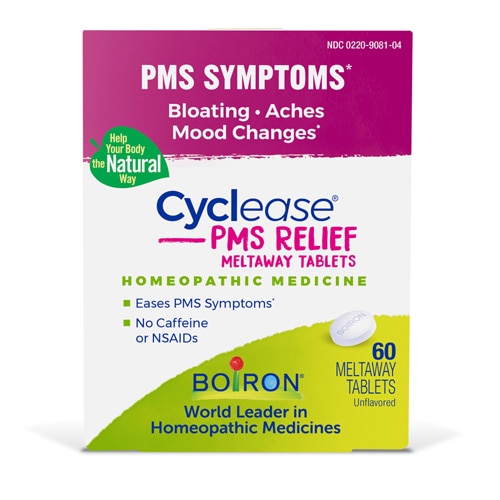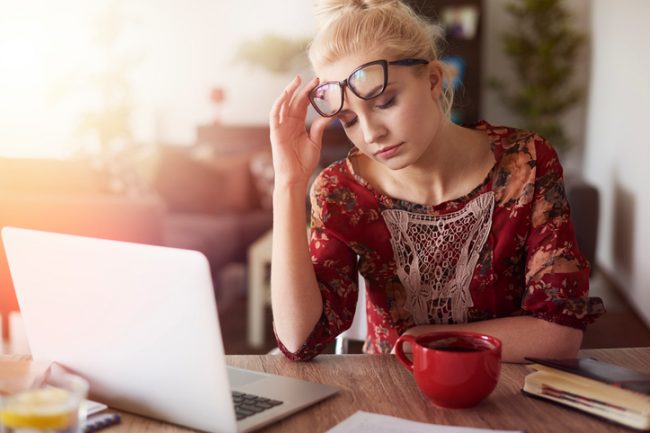Your pants don’t fit, you can’t get a wink of sleep at night, every sound around is filling you with rage and you can hardly concentrate because the only thing on your mind is an enormous bowl of ice cream, preferably smothered in hot fudge and tons of whipped topping.
Welcome to That Time of the Month, that spell, twelve times a year (more or less), that leaves you angry, weeping, joyful, claustrophobic and exhausted…in other words, feeling like your body and emotions are careening out of control—and that you have absolutely no say in it.
The good news is that you do. Officially defined as a cluster of symptoms women experience the week or two before their period—bloating, mood swings, acne, insomnia, migraines, cravings, breast tenderness and lethargy—PMS, which impacts at least 85% of menstruating women, can be relieved (and potentially even thwarted) with a few key lifestyle changes.
Here are 3 things that help when you have PMS—and 3 things that might dramatically worsen PMS symptoms:
1. Do this: eat collard greens
Rich in calcium and other minerals, collard greens can help you tackle PMS before it starts. According to a study published in the Archives of Internal Medicine, women with high intakes of calcium had “significantly reduced PMS risk,” says University of Massachusetts researcher Elizabeth R. Bertone-Johnson. "Those who ate about four servings a day of low-fat dairy or yogurt or fortified orange juice had a 40% lower risk of PMS than those who did not. That is about 1,200 milligrams of calcium or 400 international units (IU) of vitamin D each day."
Other foods high in calcium include kale, white beans, turnip greens, sesame seeds, edamame, spinach and broccoli.
Not that: pour yourself a glass of wine
It may be tempting to douse your bad mood and twisting tummy with a hearty glass of red, but alcohol may only intensify your PMS symptoms.
“Despite any evidence of wine’s effectiveness as a muscle relaxant—which could arguably make it useful in calming cramps—the fact is the overall impact of alcohol on a system going through PMS is negative,” Vine Pair writes. “Booze can actually increase physical symptoms like breast tenderness and headaches and exacerbate mood fluctuations (which alcohol already does when we’re not dealing with PMS). Even the promise of reduced cramping is likely less than guaranteed.” Indeed, The New York Times reports that alcohol consumption “may increase the risk for prolonged cramping (dysmenorrhea) during menstruation.”
How to deal? Glad you asked:
2. Do this: tie up those running shoes
With all that bloating that’s going on—to say nothing of that headache and those contractions—exercise might be the last thing you feel like you doing. But if ever is exercise a wise choice, it’s when you’re PMSing.
Why?
Right before your period, you experience a rise in the stress hormone cortisol and a dip in the calming (and happiness-boosting) chemical serotonin—a natural swing that can be combatted with the feel-good endorphins generated by exercise.
Take it from Kristen Domonell for Life by Daily Burn: “In one 2013 study, 40 young women who weren’t regular exercisers before the study and had been diagnosed with PMS were split into two groups. Half completed 60 minutes of aerobic exercise three times a week for eight weeks, while the other half kept to their normal sedentary routines. After four weeks, about 30 percent of both the physical and psychological symptoms of PMS were reduced in the newbie exercisers. And by the end of the eight weeks, moodiness and bloating significantly decreased for these women.”
You needn’t hit the treadmill, either: Swimming, yoga, Tai Chi—even sex—have all been shown to reduce the worries and blues associated with PMS.
Not that: tie up your schedule
Due to that increase in cortisol, over-committing yourself with a week of activities and social engagements is only going to magnify the stress you may be experiencing—and the agitation and anxiety that arrives with it. Now is the time to focus not on girls’ nights out and client meetings, but on soothing pursuits like journaling, reading, walking and soaking.
3. Do this: take vitamins
Scores of studies suggest that upping your consumption of vitamins in the days prior to your period may ease the discomfort produced by your uterus.
“Vitamins may be beneficial for PMS, particularly B6 and E,” says Petra Casey, MD, associate professor of obstetrics and gynecology at the Mayo Clinic in Rochester, Minnesota, Health reports.
Sound vague? Take it from Everyday Health, who writes, “Throughout your menstrual cycle, the levels of certain nutrients are thought to fluctuate. These nutrient fluctuations may cause some women to become deficient in certain vitamins and minerals at various points in their menstrual cycle, which is why some experts feel that certain vitamins and minerals may help ease PMS symptoms.”
Your top options might already be in your vitamin chest: Magnesium, vitamin B6, vitamins D and E—and the aforementioned calcium—are all suggested by the Mayo Clinic.
Not that: take a hit
As in cannabis and nicotine, that is. While some reports suggest that cannabis may be a boon for the general ickiness that emerges before your period, the potential health risks may prove to be greater.
“The medical side effects are significant,” reports the Los Angeles Times. “Smoking pot increases the risk of lung cancer 8 percent, according to British and New Zealand studies. It's associated with bronchitis, respiratory infections and increases the risk of heart attack and stroke, concluded a New England Journal study. Another 2014 study found frequent use by teenagers and young adults causes cognitive decline and decreases IQ.”
Nicotine, meanwhile, may exaggerate symptoms, due to the effects it has on estrogen and progesterone.
“We found that the risk of incident PMS tended to increase with the quantity of cigarette smoking and was significantly higher for women who began smoking during adolescence,” the National Institutes of Health reports.
All the more reason to reach for healthier means of relief instead. After all, vitamin-rich raspberries taste fabulous on cheesecake, don’t they?





